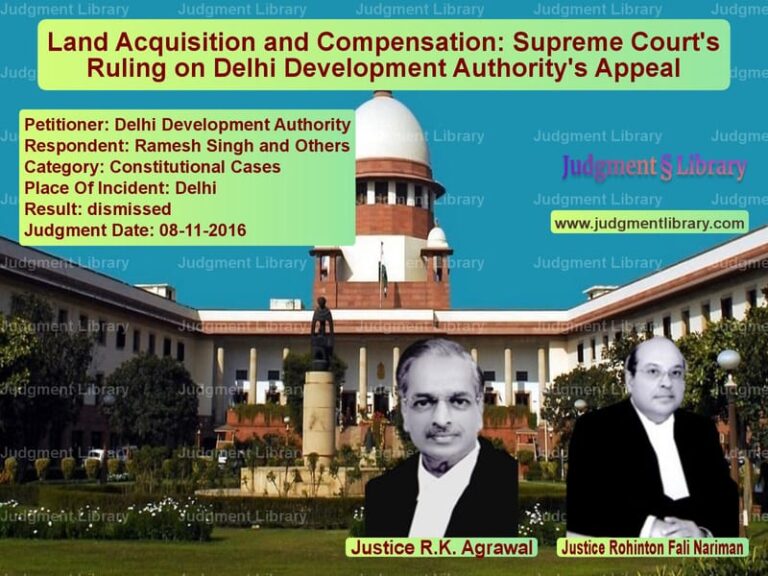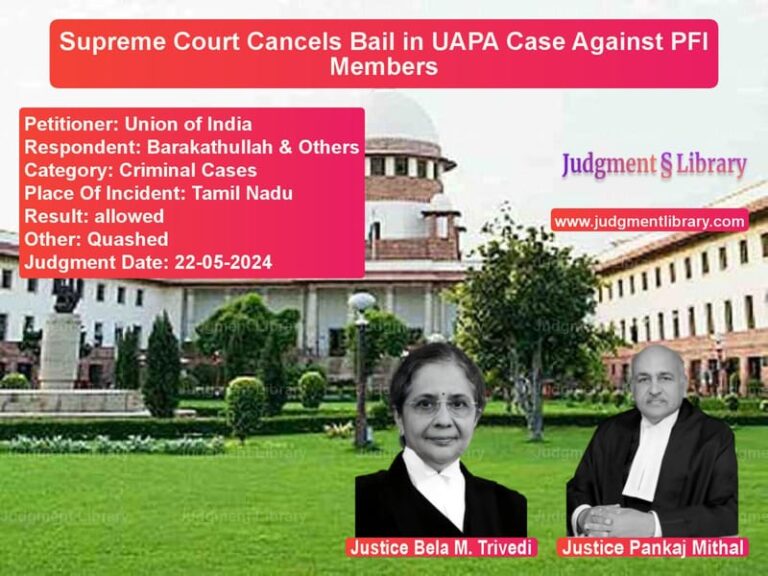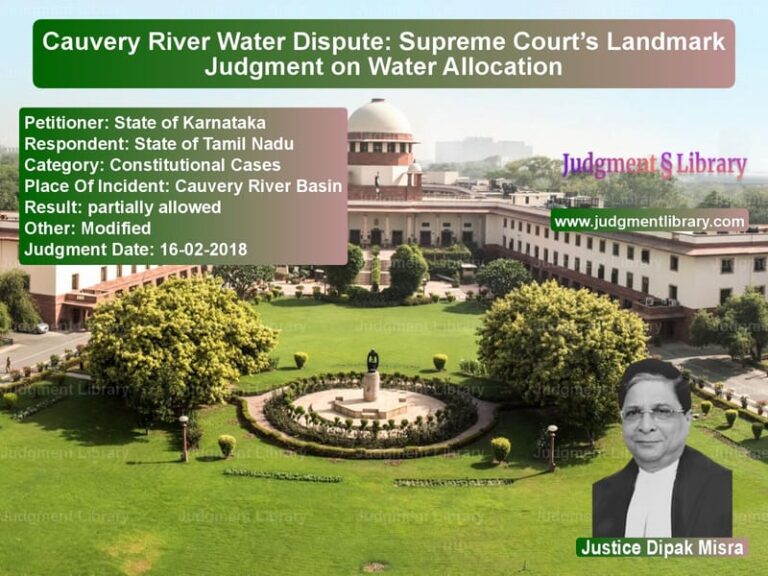Bar Council of India’s Power to Regulate Legal Education and Bar Examination: Supreme Court Ruling
The Supreme Court of India, in its judgment dated February 10, 2023, ruled on a crucial issue concerning the Bar Council of India’s (BCI) authority to regulate the process of enrolment and pre-enrolment conditions for aspiring advocates. The case, Bar Council of India vs. Bonnie Foi Law College & Ors., was referred to a Constitution Bench, which addressed the BCI’s role in maintaining standards of legal education and conducting the All India Bar Examination (AIBE).
Background of the Case
The dispute originated when the Bar Council of India (BCI) issued a directive for the establishment of a national bar examination for law graduates before they could be enrolled as advocates. The Bonnie Foi Law College, along with other law colleges, challenged the Bar Council’s decision to introduce such an examination, claiming it to be unconstitutional and beyond the BCI’s powers.
The Court was called upon to determine whether the BCI had the authority to prescribe conditions for enrolment, including a bar examination, and whether it could impose a pre-enrolment training requirement for law students before they could register as advocates.
Read also: https://judgmentlibrary.com/judicial-review-in-high-court-judge-appointments-supreme-courts-verdict/
Procedural History
The issue was first raised in 2009 when the Court appointed a committee under Mr. Gopal Subramanium, the then Solicitor General of India, to examine the issue of regulating legal education in India. The committee recommended the introduction of the All India Bar Examination (AIBE) and compulsory pre-enrolment apprenticeship, arguing that these measures were necessary to improve the quality of legal education and practice.
While the Bar Council of India moved ahead with implementing these suggestions, several stakeholders in the legal education community, including some law colleges and graduates, raised objections. These parties argued that the proposed examination and apprenticeship violated the principles of equality and freedom of choice under the Constitution of India.
Arguments by the Appellant (Bar Council of India)
- The Bar Council of India has the constitutional responsibility to regulate the legal profession, including setting standards for legal education and ensuring that candidates are qualified to practice law.
- Pre-enrolment training and an examination are necessary to ensure that aspiring advocates meet the required standards of competence.
- The legal profession, being essential for the administration of justice, must have rigorous standards to ensure that only qualified individuals are allowed to practice.
- The Bar Council is empowered under Section 49(1)(ag) of the Advocates Act, 1961, to frame rules for the practice of law, including imposing conditions like pre-enrolment training and examinations.
Arguments by the Respondents (Law Colleges and Students)
- The requirement for pre-enrolment training and an examination was not provided for in the original provisions of the Advocates Act and thus could not be unilaterally introduced by the Bar Council of India.
- The V. Sudeer case (1999) had ruled that such requirements were ultra vires the Act, and no statutory provision authorized the Bar Council of India to impose them.
- The introduction of the AIBE would create a dual system, where students from different law colleges would be treated unequally, violating the fundamental right to practice law under Article 19(1)(g) of the Constitution of India.
- There was no clear methodology for conducting the examination or ensuring that it would be fair and transparent, which would lead to arbitrariness and unfair exclusion of qualified candidates.
Supreme Court’s Observations and Judgment
The Supreme Court, in its analysis, reaffirmed the power of the Bar Council of India to regulate the legal profession, including setting the standards for admission to the Bar. The Court made the following key observations:
“Section 49(1)(ag) of the Advocates Act, 1961, grants the Bar Council of India the authority to lay down rules for the eligibility and qualification of persons entitled to be enrolled as advocates. This includes the power to prescribe pre-enrolment training and examinations.”
The Court also emphasized the need for improving the quality of legal education in India, which it stated had become a matter of concern due to declining standards. The Court recognized the importance of professional competence for those entering the legal profession, noting:
“The legal profession requires high standards of competence and ethics. It is crucial that only those who have received adequate training and have passed a qualifying examination are allowed to practice law.”
On the issue of pre-enrolment training and examinations, the Court agreed that the V. Sudeer case (1999) had ruled the 1995 Rules framed by the Bar Council of India as ultra vires, but the Court clarified that the Bar Council’s authority had been revived after the 1973 amendment to the Advocates Act. The Court observed that the Bar Council of India had the power to regulate the legal profession and could introduce necessary reforms to raise the standards of legal practice.
Key Takeaways from the Judgment
- Bar Council of India’s Authority: The Court reaffirmed that the Bar Council of India has the constitutional power to set conditions for enrolment, including pre-enrolment training and examinations.
- Pre-Enrolment Training: The Court held that pre-enrolment training and examination requirements are legal and necessary to ensure the competence of individuals entering the legal profession.
- Judicial Scrutiny: The Court emphasized that the implementation of such reforms should be fair and transparent, with clear rules and guidelines.
Implications of the Judgment
This ruling has significant implications for legal education in India. It empowers the Bar Council of India to introduce further reforms to ensure that law graduates are adequately trained and qualified before they are allowed to practice. It also sets a precedent for other professions where similar requirements for competence might be necessary.
Conclusion
The Supreme Court’s judgment in this case marks a critical point in the ongoing efforts to reform the legal profession in India. By upholding the Bar Council of India’s authority to impose pre-enrolment training and examinations, the Court has paved the way for a more rigorous and professional legal system. The judgment ensures that the quality of legal education and the competence of those entering the profession will be raised, which ultimately benefits the judiciary and the public.
Petitioner Name: Bar Council of India.Respondent Name: Bonnie Foi Law College & Ors..Judgment By: Justice Sanjay Kishan Kaul, Justice Sanjiv Khanna, Justice Abhay S. Oka, Justice Vikram Nath, Justice J.K. Maheshwari.Place Of Incident: India.Judgment Date: 10-02-2023.
Don’t miss out on the full details! Download the complete judgment in PDF format below and gain valuable insights instantly!
Download Judgment: bar-council-of-india-vs-bonnie-foi-law-colle-supreme-court-of-india-judgment-dated-10-02-2023.pdf
Directly Download Judgment: Directly download this Judgment
See all petitions in Fundamental Rights
See all petitions in Constitution Interpretation
See all petitions in Public Interest Litigation
See all petitions in Judgment by Sanjay Kishan Kaul
See all petitions in Judgment by Sanjiv Khanna
See all petitions in Judgment by Abhay S. Oka
See all petitions in Judgment by Vikram Nath
See all petitions in Judgment by J.K. Maheshwari
See all petitions in allowed
See all petitions in Modified
See all petitions in supreme court of India judgments February 2023
See all petitions in 2023 judgments
See all posts in Constitutional Cases Category
See all allowed petitions in Constitutional Cases Category
See all Dismissed petitions in Constitutional Cases Category
See all partially allowed petitions in Constitutional Cases Category







